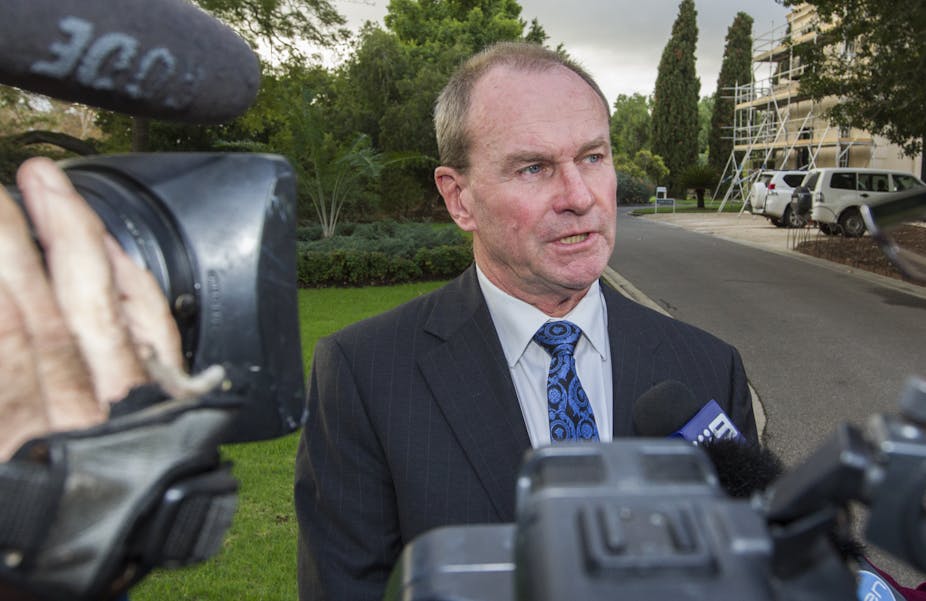The defection of former Liberal leader Martin Hamilton-Smith from his party to join the South Australian Labor government as a cabinet minister has caused outrage among his former colleagues. He has broken the golden rule of major party politics in Australia by swapping sides.
Hamilton-Smith has done so shortly after an election and in a way that not only shores up the Labor government, condemning the Liberals to a certain four more years in opposition, but delivers to him the cabinet position that all of his former party colleagues covet. Not surprisingly, his action has been condemned as treason.
Hamilton-Smith is not the first do take such a step. In recent times, Labor in South Australia has strengthened its position by including in its cabinet not only a National Party MP, Karlene Maywald, but also an independent Liberal (and former Liberal), Bob Such, and another independent. It has almost become the South Australian way.
Other independents, such as Michael Moore in the Australian Capital Territory, have also joined cabinets, in his case a Liberal government. Most notably, the Gillard minority government at the federal level was supported by independents with party backgrounds as MPs, former National Rob Oakeshott and former Liberal Peter Slipper, as well as independent Tony Windsor, a one-time National Party candidate. Slipper was rewarded with the position of Speaker of the House of Representatives.

There are other examples but they have involved swapping to or from a minor party. In South Australia Labor’s Kris Hanna moved to the Greens. More notably, former Australian Democrats leader Cheryl Kernot switched to Labor. Such swapping of sides still causes heartache and accusations of betrayal, even though in Kernot’s case she left the parliament and stood for Labor at the next election.
But nothing quite matches swapping sides from one major party to the other. And, of course, Australian political history has been dotted with party splits, especially in the Labor Party, which have led to MPs crossing en masse from one side of the divide to the other. Conservative prime ministers Billy Hughes and Joe Lyons started their parliamentary lives in the Labor Party.
In the 1950s Labor lost MPs to the new Democratic Labor Party, though these MPs effectively condemned themselves to exile and ultimate defeat rather than the reward of high office. They, like many before them, were condemned as Labor “rats” for deserting their party.
Team loyalty runs deep in Australia
Before discussing what this tells us about our party system and the conduct of our parties as a whole it should be noted that team loyalty and the alleged crime of defection is not restricted to party politics. Sectarianism in Australian society was based on an equally deep divide between varieties of Christianity, generally between Catholics and Protestants.
The same is true in sporting competitions, whether it be the Holden-Ford divide in motor sport or the club loyalties in football codes. If anything matches the party divide between Liberal and Labor in South Australia, for instance, it is the tension bordering on hatred between supporters of Port Adelaide and the Adelaide Crows in the AFL. Many of these tensions, as in politics, are overlaid by social class and educational differences.
Deserters in politics, sport and religion, are vilified because they are a threat to a system that is based on exaggerating the differences between the two sides. In politics it is even argued that the policy differences between the major parties have declined in recent years.
These claims of policy convergence can be exaggerated, but it is true that social background differences have narrowed and market economics has captured both sides.
Can we look beyond adversarial politics?
Strong party discipline reinforces the differences between Labor and Liberal in parliament. Labor MPs have taken the Pledge of Solidarity and Liberals behave almost as though they had. They vilify each other in election campaigns and punish any MP who has the temerity to cross the floor on legislation. Even when these MPs are not threatened with dis-endorsement they are regarded as “unsound” and passed over for promotion to ministerial ranks.
Hamilton-Smith’s defection should be seen against this background. Rather than recognising what parties and individuals have in common, political behaviour is based on competition rather than consensus. Adversarial politics, which sees no good in the other side, is encouraged by news media that like to emphasise disagreement rather co-operation.
In any individual case of defection motivation will vary. Personal advancement will mix with principle. Opposition is the worst place to be so the promise of a cabinet position will be attractive, just like the promise of a premiership to a football player who has spent their career in a bottom team.
But the wider picture is more important. The South Australian cabinet will be stronger with Hamilton-Smith’s inclusion. If in the process his action makes us look again at the weaknesses of adversarial politics and the false gulf manufactured between the parties then something of greater value will have been achieved.

